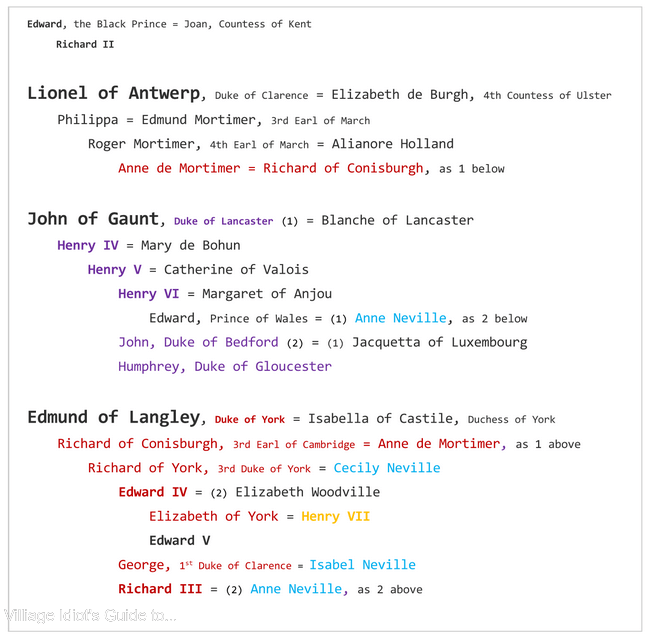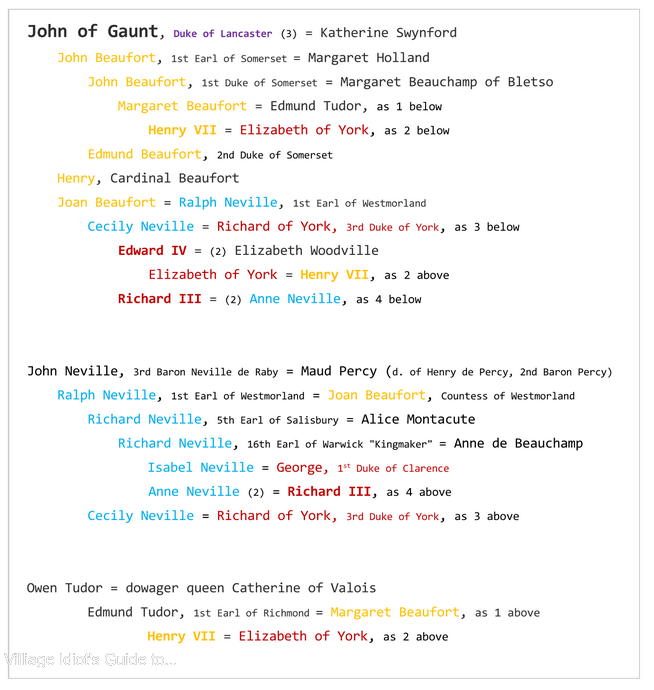Table of Contents
Wars of the Roses: Background
The Wars of the Roses were a series of battles fought between the supporters of the House of Lancaster (Lancastrians - red rose) and the supporters of the House of York (Yorkists - white rose).
Both houses were direct descendants of king Edward III, a tangled dynastic briar, with causes of the wars dating back to power struggles between Edward's sons:

Lancaster...
Edward III's eldest son, Edward 'the Black Prince', had died of the plague in 1376, and so it was the prince's ten year old son, Richard, who became king as Richard II. Initially, because of Richard's age, his uncle, John of Gaunt, Duke of Lancaster, ruled the country; but, as Richard grew older, he rebelled against his uncle. Then, in 1399, John died, and Richard confiscated the land John's son, Henry, expected to inherit. Henry raised an army and, when Richard surrendered, took the throne as Henry IV. Richard was imprisoned in Pontefract castle and died in February 1400. Henry maintained his place on the throne until his own death in 1413, when his son Henry succeeded him.
Henry V invaded France, conquering Normandy and Rouen for England. In 1420 he married Catherine of Valois, the daughter of the king of France, and they had one child, Henry, yet died from dysentery in 1422.
Henry VI was not a strong king like his father, Henry V. Still an infant when his father died, it was four paternal kinsmen1) who ruled England and France in his place. He was crowned King of England2) and, through the Treaty of Troyes, King of France3) after the death of his maternal grandfather Charles VI. In adulthood, however, he was dominated by his ambitious wife, Margaret of Anjou, and prone to psychotic episodes.
York...
Richard of York, 3rd Duke of York was appointed Regent and commander of the English forces in France in 1436, taking the place of the king's recently deceased uncle John of Lancaster, 1st Duke of Bedford. The main objective was to retain land in France until Henry VI reached majority to rule in his own right. Richard settled his troops in Normandy. He returned to England in November 1437. When peace negotiations failed in 1440, Richard was again sent to France, this time as Lieutenant.
... and enter the Beaufort line: excepta dignitate regali
In 1443, John Beaufort, 1st Duke of Somerset, was given command of a large number of troops, disrupting Richard's resources. Somerset's appointment, however, achieved nothing and he died on 1444.
Richard returned to England again in 1445, more than likely expecting his services in France to continue, yet the lieutenancy was given to John Beaufort's brother, Edmund, 2nd Duke of Somerset. If the intrusion of 1443 by John Beaufort hadn't already caused a problem for Richard, this most certainly did.
1447 saw the mysterious death of the king's uncle (and heir presumptive) Humphrey, Duke of Gloucester, and Richard became a possible successor to the English throne should Henry VI die childless - this year also brought Richard a ten year appointment as Lieutenant of Ireland: an office in exile.
By 1449, the English failures in France were mounting up. Edmund Beaufort surrendered Rouen, leading directly to the fall of Normandy. Yet, despite becoming unpopular, as a favourite and cousin4) of King Henry VI, Edmund retained his position in court. Further disaster followed in 1451 with the loss of Bordeaux, and the English troops were finally driven from France by the defeat at the battle of Castillon in Gascony5), 1453.
King Henry suffered a breakdown and although the king's council continued working, with the death of the Chancellor, Cardinal John Kemp, in March 1454, this was no longer constitutional. Despite being opposed by the king's wife, Margaret of Anjou, Richard was named regent as Protector of the Realm five days later. Richard appointed his brother-in-law, Richard Neville, 5th Earl of Salisbury, as Chancellor, and had Edmund Beaufort imprisoned in the Tower of London, while also dismissing some of the Queen’s Lancastrian advisors.
“If Henry's insanity was a tragedy, his recovery was a national disaster.”
- R.L. Storey, historian.
Upon his recovery, Henry dismissed Richard and reversed his appointments. Once again, Edmund Beaufort was shown favour, receiving the Captaincy of Calais6) at the expense of Richard. Richard Neville resigned and, with his son, Richard Neville, 16th Earl of Warwick (the “Kingmaker”), joined Richard of York in recruiting troops.
